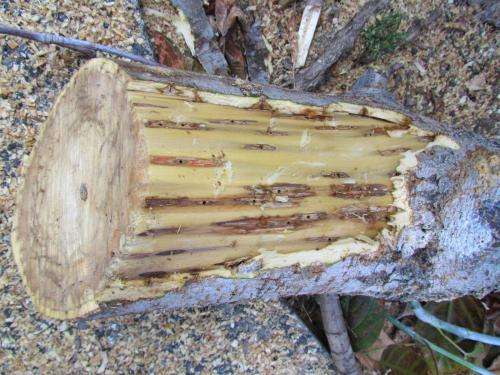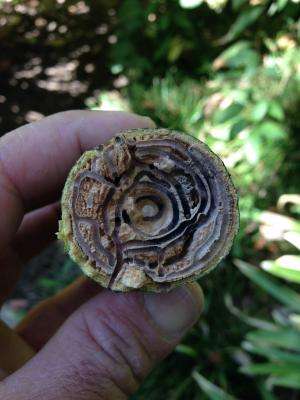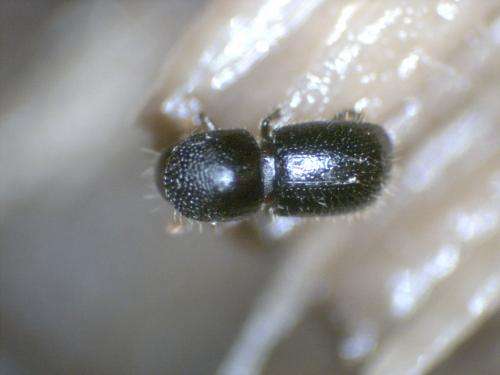New invasive beetle-fungus complex discovered in Riverside and San Diego Counties

(Phys.org) —A recently discovered beetle-fungus complex that has been causing dieback and mortality to numerous agricultural and landscape ornamental trees in Los Angeles County has been detected in Riverside and San Diego counties.
The fungus Fusarium euwallaceae forms a symbiotic relationship with the beetle that is known as the polyphagous shot hole borer (PSHB, Euwallacea sp.). Together, they cause the disease Fusarium dieback (FD).
"This beetle has also been found in Israel, and since 2009, the beetle-fungus combination has caused severe damage to avocado and landscape trees there," said Akif Eskalen, an extension plant pathologist at the University of California, Riverside.
Eskalen first discovered the beetle-fungus complex in 2012 on backyard avocado trees in Los Angeles County. Since then, his lab has conducted ongoing monitoring efforts in Southern California to address the problem.
"Our survey efforts show that this pest/disease complex is actively spreading in Los Angeles, Orange and recently San Bernardino, Riverside and San Diego counties," Eskalen said.
When the beetle burrows into the tree, it inoculates the host plant with the fungus, which is carried in its mouthparts in a structure called mycangia. The fungus attacks the vascular tissue of the tree, blocking the transport of water and nutrients from the roots to the rest of the tree, and eventually causing FD and tree mortality. The beetle larvae live in galleries within the tree and feed on the fungus.

FD has been observed on more than 117 different plant species in Southern California, including many species commonly found in urban landscapes. Preferred trees include about one third of the street trees in Southern California, avocado, and nine tree species native to California.
The following is a selective list of host trees:
- box elder (Acer negundo)
- castor bean (Ricinus communis)
- avocado (Persea americana)
- coast live oak (Quercus agrifolia)
- English oak (Q. robur)
- valley oak (Q. lobata)
- cork oak (Q. suber)
- California sycamore (Platanus racemosa)
- red willow (Salix laevigata)
- big leaf maple (Acer macrophyllum)
- Japanese maple (A. palmatum)
- goldenrain (Koelreuteria paniculata)
- olive (Olea europaea)
- persimmon (Diospyros sp.)
- white alder (Alnus rhombifolia)
- silk tree (Albizia julibrissin)
- coral tree (Erythrina corallodendon)
- weeping willow (Salix babylonica)
- blue palo verde (Parkinsonia florida)
- palo verde (Cercidium floridium)
- tortuosa (Salix matsudana)
What to do if you suspect a tree has FD:
- Look for a single entry/exit hole surrounded by wet discoloration of the outer bark, or gumming, staining, white powdery exudate and frass.
- Scrape off the bark layer around the infected area to look for brown discolored necrosis caused by the fungus.
- Follow the gallery to look for the beetle (may or may not be present).
- Avoid movement of infested firewood and chipping material out of infested area.
- Look for other hosts (castor bean, sycamore, maple, coast live oak, goldenrain) showing symptoms of the beetle/disease.
- Sterilize tools to prevent to spread of the disease with either 25 percent household bleach, Lysol® cleaning solution, or 70 percent ethyl alcohol.

Whom to contact if you find the problem:
If you suspect that this beetle/fungus complex is on your tree, please contact either your local farm advisor, pest control advisor, county Ag Commissioner Office. You may also contact Eskalen at 951-827-3499 or akif.eskalen@ucr.edu.
More information: For more information, see eskalenlab.ucr.edu/
Provided by University of California - Riverside

















